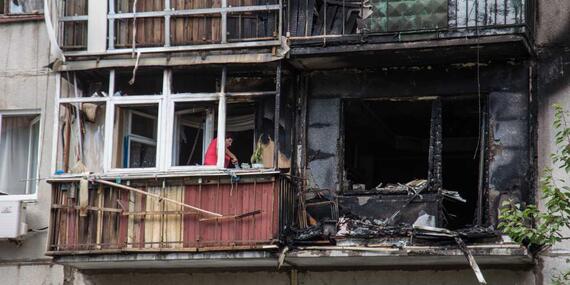Today's top news: Ukraine, Sudan, Chad

Ukraine
There was a horrific attack on Tuesday in the east of Ukraine, in the town of Kramatorsk in the Donetsk region. The UN Humanitarian Coordinator in Ukraine, Denise Brown, said the attack is an example of the inexcusable level of suffering Russia’s invasion is inflicting on the people of Ukraine.
The Office of the UN High Commissioner for Human Rights has, to date, verified more than 50 civilian casualties, with 12 people killed, including 3 children. This makes it the second deadliest attack in Ukraine since January when more 40 people were killed in Dnipro when a missile struck a residential building.
Multiple residential buildings, shops, restaurants and schools were damaged as a result of the attack in Kramatorsk. The town has been used as a hub by humanitarians and volunteers working in the east of the country.
International humanitarian law protects civilians and civilian infrastructure, and everything must be done to minimize or avoid civilian harm, including by verifying targets.
Humanitarian organizations on the ground mobilized immediately, including by providing first aid supplies, shelter support and cash assistance. Our partners have delivered construction kits, tarpaulin and other materials in the first 24 hours to repair roofs and windows. They have also set up psychological support to help people cope with the immediate shock and trauma.
Sudan
The number of people affected by the conflict in the country continues to rise.
More than 2.1 million people have been displaced inside the country since 15 April, including 1.4 million people who fled the capital Khartoum. More than 560,000 people have crossed the border into neighbouring countries, mostly to Egypt, Chad and South Sudan.
In the last two months, humanitarian organizations have reached more than 2.8 million people across the country, including food, nutrition, health, water and protection services.
But insecurity and bureaucratic access impediments, including the lack of visas for international non-governmental organizations, as well as attacks against humanitarian premises and warehouses, continue to hamper our ability to safely deliver aid. We face tremendous difficulties in reaching people in conflict-affected areas in Khartoum, Darfur and Kordofan.
Since the start of the crisis, 13 humanitarian workers have killed, with many more having been injured and some unaccounted for.
Our partners have reported 43 humanitarian warehouses have been looted, making it even more difficult to resume and scale-up aid operations.
OCHA continues to facilitate the movement of relief supplies from Port Sudan and across conflict lines. Between the end of May and the end of June, 480 trucks carrying some 19,700 metric tons of aid have been delivered to Aj Jazirah, Khartoum, Gedaref, Kassala, Sennar, Northern State, River Nile and Blue Nile states.
Chad
More than 200,000 people have fled Sudan to seek refuge in Chad. This includes both Sudanese and Chadians returning to their country. Prior to the outbreak of fighting in Sudan, Chad was hosting nearly 600,000 refugees – including 400,000 from Sudan.
The UN Refugee Agency and the Chadian Government are relocating people from the border, where they are exposed to flooding and security risks. Last week, the Emergency Relief Coordinator, Martin Griffiths, allocated US$6 million from the Central Emergency Response Fund for response efforts in Chad.
This funding will support host communities in eastern Chad who need food and livelihoods support as they face the lean season, as well as the impacts of floods and the neighbouring Sudan crisis.
